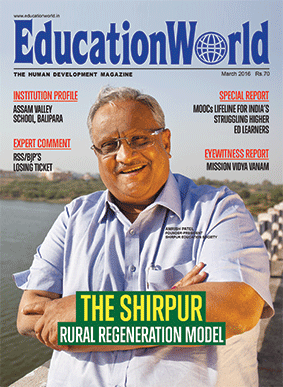 The cover feature ‘The Shirpur Rural Regeneration Model’ was informative and enlightening (EW March). Engineering this one-of-its-kind success story in the rural hinterland is a truly remarkable achievement of Amrish Patel. His development model combining education, water management and conservation, employment generation and environment sustainability is the magic formula for transforming India’s 600,000 villages into prosperous communities.
The cover feature ‘The Shirpur Rural Regeneration Model’ was informative and enlightening (EW March). Engineering this one-of-its-kind success story in the rural hinterland is a truly remarkable achievement of Amrish Patel. His development model combining education, water management and conservation, employment generation and environment sustainability is the magic formula for transforming India’s 600,000 villages into prosperous communities.
In reality, it’s red tape which is preventing the regeneration of our villages. There are thousands of committed people in India who want to start schools, colleges, and small businesses. But red tape kills their projects even before they begin.
Manish Kulkarni
Mumbai
Unwarranted optimism
You have written an overly optimistic story on massive open online courses (Moocs) in your latest issue (EW March). The potential of Moocs to revolutionise higher education in India is very limited. First, the large majority of the population doesn’t have access to broadband internet, which is a must for accessing Moocs.
Second, all Moocs are in English language which again a majority of the student population cannot understand sufficiently to learn independently. Third, in a country where exam cheating is routine and plagiarism is rampant, students cannot be trusted to study and submit assignments for independent grading.
So unfortunately, Moocs will only help privileged students studying in elite colleges, while those in tier II and III cities and villages will be left to contend with sub-standard faculty and obsolete curriculums.
Parvati Sengupta
Delhi
Make music compulsory!
Tanuja Gomes has presented an excellent case for the compulsory introduction of music in schools (EW February).
Music doesn’t recognise man-made boundaries and helps to bridge differences between people from different countries, cultures and religions. Schools should introduce music education not just to improve their students’ learning outcomes but to also transform them into humane, caring and peace-loving citizens.
Mahesh Kapasi
Delhi
Dismal & depressing
Your cover story ‘Heavy price of education neglect’ (EW January) is revealing. In the story, you have reported that India spends 4 percent of its GDP on public health. You have also observed that it’s a doubtful figure as it may include private spending. You are right: 4 percent is public plus private spending on health.
Sadly, public spending on health in India is only 1.3 percent of its GDP (2013) against China’s 3.1 percent and Japan’s 8.5 percent. India’s public expenditure on education (less than 3 percent) and health (less than 1.4 percent) is dismal and depressing. Your plea for greater public spending on education and health is timely and merits serious consideration.
Prof. A.S. Seetharamu
Bangalore
Survey dissatisfaction
It’s a matter of great pride for Seth Anandram Jaipuria School, Ghaziabad to be rated among the country’s best schools in your EW India School Rankings (September 2015). But, on the parameters of teacher welfare, competence of faculty, leadership/management quality, we are not satisfied with the ratings awarded to us. Moreover, we would like to state that no formal data was collected from the school or any other reliable source for the purpose of rankings.
We suggest that for the next rankings survey, the data should be directly collected from the school.
Manju Rana
Principal, Seth Anandram Jaipuria School, Vasundhara, Ghaziabad
The annual EW India School Rankings 2015 are based on the perceptions of 11,660 parents, teachers and educators countrywide — Editor
Beyond syllabus paper
I want to draw your attention to the sad plight of class XII students who wrote their CBSE maths paper on March 14. The majority of students complained that the paper was lenghty and tough.
CBSE has betrayed students by setting questions which are not in line with the NCERT syllabus and published sample question papers. It seems that the maths paper was designed by tutors of private coaching institutes such as FITJEE, VMC etc. I wonder if there is an education mafia involved which wants to push students into coaching institutes? This possibility needs to be investigated.
Sundeep Jauhar on e-mail